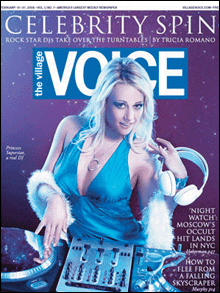 These days, you can’t tell the players in New York’s suddenly volatile weekly-newspaper world without a scorecard.
These days, you can’t tell the players in New York’s suddenly volatile weekly-newspaper world without a scorecard.
At the Village Voice, the 50-year-old granddaddy of alternative journalism, editor Don Forst and publisher Judy Miszner recently departed, their exits a byproduct of the Voice’s merger with the powerful New Times Media company. After a nervous meeting several weeks ago between the new conglomerate’s executive editor Mike Lacey and Voice staffers, Sydney Schanberg resigned his media column, columnist Nat Hentoff’s future seems cloudy, and more staff turnover appears inevitable as the venerable organ of progressive politics is pushed toward a new editorial model.
The news was equally dramatic last week at the New York Press, a weekly created in 1988 largely as an alternative to the Voice, when four of its five staff editors and writers resigned after management decided not to let them publish the riot-inspiring Prophet Mohammed cartoons. The departures of editor-in-chief Harry Siegel, managing editor Tim Marchman, arts-and-entertainment editor Jonathan Leaf, and City Hall reporter Azi Paybarah — a team that had been in place since last summer — leaves the future of the unstable Press up for grabs.
It’s rare enough to have this kind of upheaval at two competing papers simultaneously, but the turmoil at the Press and the Voice reflects a similar uncertainty about their editorial missions. It’s a sure indicator that the alt-weekly business, despite its long-entrenched emphasis on politics, pop culture, and stylistic license, is struggling for relevance in an increasingly fragmented marketplace where there are now numerous rivals — including the blogosphere — to the alternative press.
In the case of the Voice, the upheaval may lead to a different journalistic mission. In the case of the Press, it may offer an opportunity to finally define itself.
Lacey stresses that he is looking for more original reporting and “magazine-style journalism” at the Voice and bemoans the amount of similar-sounding commentary on its pages. “This industry has been afflicted by this kind of shut-in mentality,” he says. “Are people prepared to receive the message? There were a lot of people [at that meeting] who didn’t like what I said.”
Aware of the Voice’s left-liberal politics, Lacey says he’s not opposed to Bush-bashing, but insists he wants it to be homegrown.
“No one has given journalists more ammunition in America than this guy,” he says. “Let’s go get it.”
Marchman, who says the suddenly departed Siegel regime was trying to restore the Press to its status as “a genuinely independent” paper, adds: “The idea of the paper that the Press once was.... I think that paper’s dead. I think it will be an arts-and-entertainment weekly with the kind of standard content.”
“In the larger context of alt-weeklies,” he continues, “I think it’s a sad time in New York right now.”